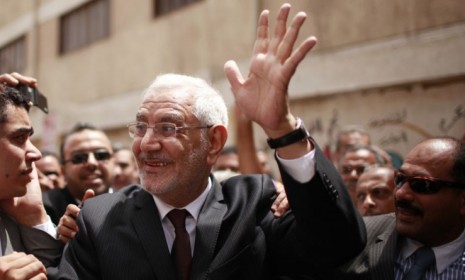Egypt's historic presidential election: 4 key questions
More than a year into their revolution, Egyptian voters are going to the polls, and for the first time in recent memory, they don't know the winner ahead of time

Millions of Egyptians stood in line for hours Wednesday to freely choose their president for the first time in their country's long history. The election, which will continue on Thursday, pits secularists against Islamists, and revolutionaries against old regime figures promising to restore stability after nearly a year and a half of turmoil following the toppling of longtime leader Hosni Mubarak. What will the vote mean for Egypt's future? Here are four critical questions about the election, and what the result will mean:
1. Which candidates will make the run-off?
Anointed candidates in the Mubarak era frequently won with 90 percent of the vote, says Simon Allison at South Africa's Daily Maverick, but nobody will dominate this time. So the central question is which two candidates will make the run-off on June 16 and 17. Thirty percent of the electorate was undecided heading into the vote, but three names stand out in the field of 13: The Muslim Brotherhood's Mohammed Mursi, the secular Amr Moussa, and Abdel Moneim Aboul Fotouh, an Islamist who is using a unifying message to appeal to secularists. Once the run-off rivals are chosen, a "whole new round of politicking" will begin.
The Week
Escape your echo chamber. Get the facts behind the news, plus analysis from multiple perspectives.

Sign up for The Week's Free Newsletters
From our morning news briefing to a weekly Good News Newsletter, get the best of The Week delivered directly to your inbox.
From our morning news briefing to a weekly Good News Newsletter, get the best of The Week delivered directly to your inbox.
2. Is Egypt going Islamist?
A win for the fundamentalist Muslim Brotherhood's Mursi would "likely mean a greater emphasis on religion in government," says The Associated Press. The Brotherhood, outlawed under Mubarak, wants to implement a moderate version of Islamic law. Its leaders say they "won't mimic Saudi Arabia and force women to wear veils or implement harsh punishments like amputations." Still, liberals say imposing sharia would curtail newly won rights, and Moussa and other secularists are vowing to prevent Islamization of the government. "But that will mean frictions with parliament if they win," because the Brotherhood already dominates there.
3. Will the army really hand over power?
The military has dominated the government for decades, and may be reluctant to "quietly give it all up," says Hamza Hendawi of The Associated Press. Pro-democracy groups insist the revolution can't succeed until the army is stripped of its political power. But the military reportedly favors a candidate tied to the old ways: Ahmed Shafiq, a former air force commander who was Mubarak's prime minister in his last days in power. "Islamists have threatened massive protests if he is elected, and contend that he could only win if the vote was rigged."
A free daily email with the biggest news stories of the day – and the best features from TheWeek.com
4. Will women be the key voting bloc?
Women played a big role in the protests that toppled Mubarak, says Jon Leyne at BBC News, but "so far, they have not reaped much of a reward." And activists fear that the new parliament, which is almost exclusively male and dominated by Islamists, "could roll back women's rights." But for now, the presidential election offers women a chance to be heard, and several frontrunners have taken notice: The moderate Islamist Abdul Moneim Aboul Fotouh is promising gender equality, and Shafiq has pledged to appoint a woman as vice president.
-
 The best dark romance books to gingerly embrace right now
The best dark romance books to gingerly embrace right nowThe Week Recommends Steamy romances with a dark twist are gaining popularity with readers
-
 The ocean is getting more acidic — and harming sharks’ teeth
The ocean is getting more acidic — and harming sharks’ teethUnder the Radar ‘There is a corrosion effect on sharks’ teeth,’ a study’s author said
-
 6 exquisite homes for skiers
6 exquisite homes for skiersFeature Featuring a Scandinavian-style retreat in Southern California and a Utah abode with a designated ski room
-
 The billionaires’ wealth tax: a catastrophe for California?
The billionaires’ wealth tax: a catastrophe for California?Talking Point Peter Thiel and Larry Page preparing to change state residency
-
 Bari Weiss’ ‘60 Minutes’ scandal is about more than one report
Bari Weiss’ ‘60 Minutes’ scandal is about more than one reportIN THE SPOTLIGHT By blocking an approved segment on a controversial prison holding US deportees in El Salvador, the editor-in-chief of CBS News has become the main story
-
 Has Zohran Mamdani shown the Democrats how to win again?
Has Zohran Mamdani shown the Democrats how to win again?Today’s Big Question New York City mayoral election touted as victory for left-wing populists but moderate centrist wins elsewhere present more complex path for Democratic Party
-
 Millions turn out for anti-Trump ‘No Kings’ rallies
Millions turn out for anti-Trump ‘No Kings’ ralliesSpeed Read An estimated 7 million people participated, 2 million more than at the first ‘No Kings’ protest in June
-
 Ghislaine Maxwell: angling for a Trump pardon
Ghislaine Maxwell: angling for a Trump pardonTalking Point Convicted sex trafficker's testimony could shed new light on president's links to Jeffrey Epstein
-
 The last words and final moments of 40 presidents
The last words and final moments of 40 presidentsThe Explainer Some are eloquent quotes worthy of the holders of the highest office in the nation, and others... aren't
-
 The JFK files: the truth at last?
The JFK files: the truth at last?In The Spotlight More than 64,000 previously classified documents relating the 1963 assassination of John F. Kennedy have been released by the Trump administration
-
 'Seriously, not literally': how should the world take Donald Trump?
'Seriously, not literally': how should the world take Donald Trump?Today's big question White House rhetoric and reality look likely to become increasingly blurred